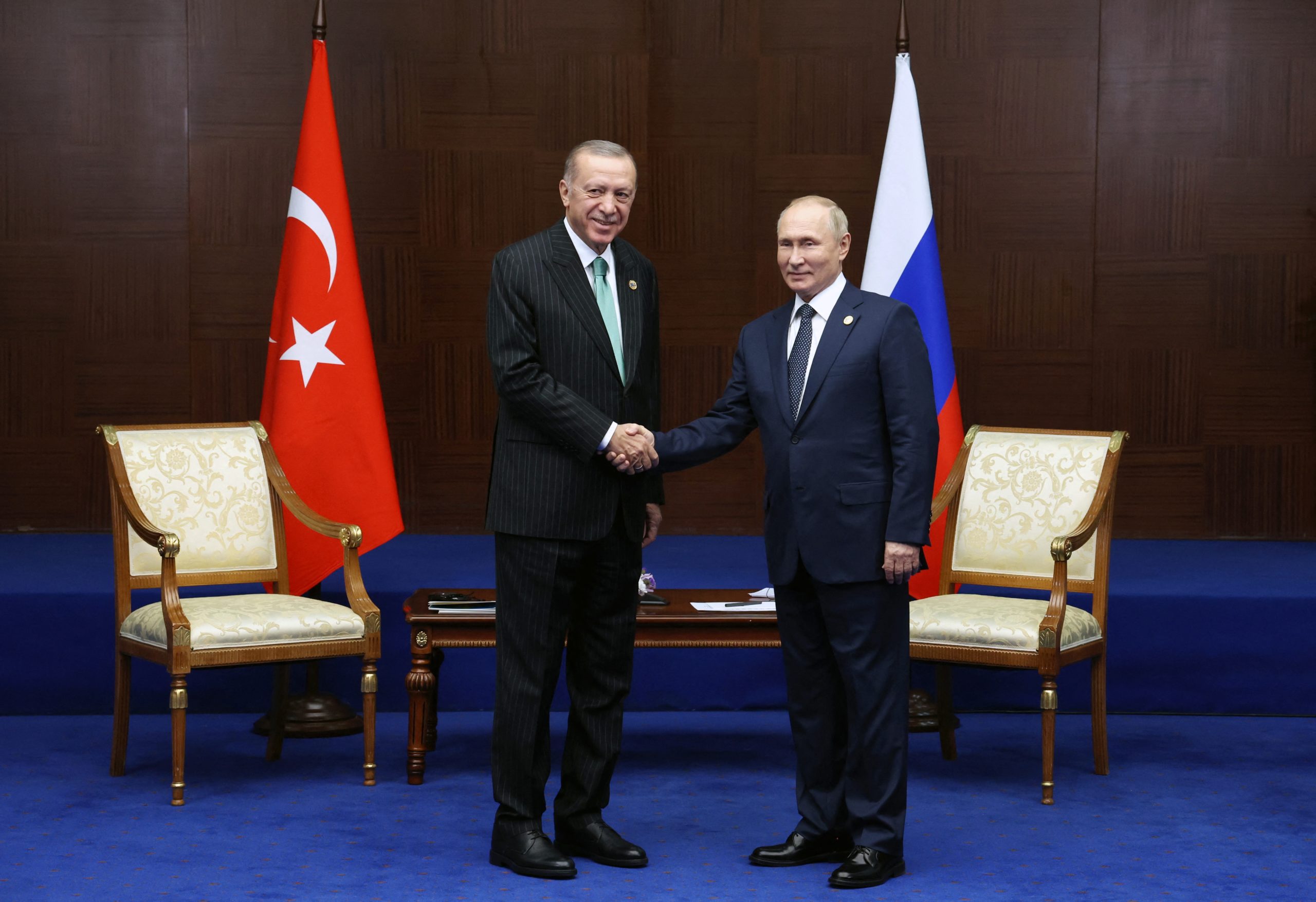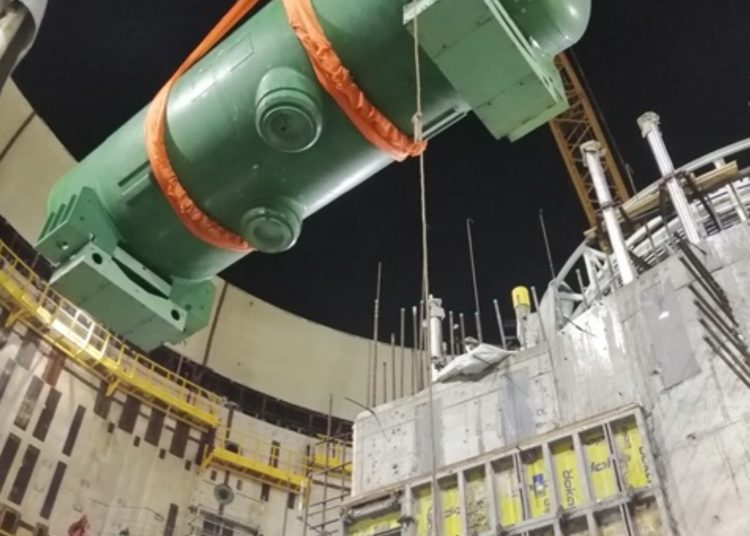Levent Kenez/Stockholm
The December 2024 issue of Communication and Diplomacy, a Turkish government journal produced by the Directorate of Communications, which also serves as President Recep Tayyip Erdogan’s propaganda office, has published an analysis of the personnel training program for employees at the Akkuyu Nuclear Power Plant (NPP), currently under construction in Mersin, which is set to commence energy production by July 2025. The study highlights the dual nature of the scholarship initiative implemented for plant personnel, which simultaneously meets Turkey’s technical needs for its first nuclear power plant while advancing Russia’s broader energy and foreign policy objectives.
Authored by researchers Büşra Selin Erdogan, an assistant specialist at the Presidency for Turks Abroad and Related Communities (Yurtdışı Türkler ve Akraba Topluluklar Başkanlığı, YTB), and Burak Erdogan, a research assistant at Ankara University, the article frames the Akkuyu NPP personnel training program as a successful example of Russia’s carefully designed policies that align with its foreign policy priorities. “It is fair to state that Russia carries out an effective education diplomacy that is compatible with her own interests with the scholarship program, which is carried out meticulously,” the authors conclude. The initiative demonstrates how Russia combines its energy policy with educational diplomacy as part of its broader “imperial” strategy, using these tools to strengthen its influence over key partners like Turkey.
The program, launched in 2011, has trained more than 319 Turkish engineers at Russian universities who now work at Akkuyu, located on the Mediterranean coast of southern Turkey. According to the study, this ensures that highly skilled personnel familiar with Russian energy standards and practices are at the core of Turkey’s nuclear workforce. This strategic positioning strengthens Russia’s operational presence in the Akkuyu project and underscores the country’s calculated approach to extending its influence. “Through meticulous planning, Russia ensures it works with reliable and familiar human resources,” the authors state, describing how the program secures both technical expertise and stronger bilateral ties.
A unique aspect of the program is its cultural and educational depth. Participants are required to learn Russian and adapt to the academic environment in Russian institutions. This not only prepares them for the technical demands of the nuclear sector but also fosters a deeper integration with Russian professional and cultural norms. The study points out that this immersion enhances Russia’s soft power, building a workforce in Turkey that is shaped by Russian methodologies and cultural frameworks.
The text of an article on the Akkuyu plant in Communication and Diplomacy, an official publication of the Turkish government:
The analysis, however, avoids framing the program as a direct threat to Turkey’s sovereignty. Instead, it presents a nuanced perspective, acknowledging the mutual benefits of the initiative while underlining its alignment with Russia’s strategic interests. The authors highlight how Russia’s approach to education diplomacy serves to embed its influence in critical sectors like energy, noting that this careful balance allows Moscow to consolidate its standing as a key player in Turkey’s nuclear energy ambitions.
The timing of the program is particularly noteworthy. The first Akkuyu reactor license was granted in 2018, yet the personnel training program began as early as 2011. This suggests that the initiative was part of a longer-term strategy to establish a strong foundation for Russian involvement in Turkey’s nuclear sector. By beginning the program well in advance, Russia ensured that Turkish personnel would be trained and ready to operate within a framework heavily influenced by Russian expertise and systems.
The article also contextualizes the Akkuyu initiative within Russia’s historical reliance on education diplomacy as a tool of influence. Russia has long leveraged its academic institutions to project its soft power internationally. The Akkuyu program fits into a broader strategy that includes training students from over 65 countries in nuclear-related disciplines. While this bolsters Russia’s global reputation in nuclear education, the study notes that Turkey’s role as a partner in such a strategically significant project makes the Akkuyu programs particularly impactful for Russian foreign policy.
One of the study’s key observations is the deliberate intertwining of Russia’s energy and educational strategies. By integrating these two domains, Russia positions itself as an indispensable partner in Turkey’s nuclear journey. The authors emphasize that this dual approach not only serves Russia’s operational needs but also ensures lasting cultural and professional ties between the two nations. This sophisticated strategy exemplifies how Moscow utilizes both hard and soft power to maintain influence over its partners.
The English and Russian text of a 2010 agreement between Russia and Turkey on the construction of a nuclear power plant in Turkey:
Ultimately, the Communication and Diplomacy article presents the Akkuyu NPP personnel training programs as a microcosm of Russia’s foreign policy strategy. By blending education and energy diplomacy, the initiative reflects a calculated effort to strengthen Moscow’s position on the global stage while fostering deep ties with key partners. The study concludes that maintaining a balance between collaboration and strategic independence will be crucial for Turkey as it moves forward with its nuclear energy ambitions.
Some potential risks can be identified based on the article. Turkey’s increasing reliance on Russian expertise in the nuclear energy sector could affect its ability to independently develop and manage its nuclear capabilities. This dependence may limit Turkey’s strategic autonomy and expose the country to external influences in a crucial industry. While not directly stated, this concern suggests that there could be long-term implications for Turkey’s energy sector.
Additionally, the cultural aspects of the program are worth considering. While learning Russian and adapting to the Russian academic environment are not inherently negative, these requirements could lead to stronger cultural ties between Turkey’s workforce and Russian institutions. Over time, this may influence Turkey’s domestic policies and international relations, potentially aligning them more closely with Russian perspectives and interests. This is something policymakers may want to consider as part of the broader implications of the nuclear energy partnership.
Turkey announced in 2022 that it would not be a shareholder in the Akkuyu NPP, despite earlier assumptions. It was clarified that Turkey is not contributing to the construction costs and its involvement is limited to a compulsory electricity purchase agreement, with no plans to acquire a stake in the power plant.

President Erdogan does not view reliance on Russian energy as a national concern. Speaking at the 2024 UN Climate Change Conference (COP 29) in Baku on November 12, Erdogan emphasized Turkey’s commitment to achieving carbon neutrality by 2053, highlighting nuclear energy as a cornerstone of this strategy. He announced Turkey’s goal of reaching a capacity of 20,000 megawatts of nuclear power by 2050, unveiling plans for two additional nuclear facilities: one in Sinop on the Black Sea coast and another in the Thrace region. For the Sinop plant, Turkey is continuing its partnership with Russia, mirroring the Akkuyu model.
In an October 27 interview with Russia’s RT network, Alexey Likhachev, head of the Rosatom State Corporation, confirmed that Erdogan had invited Rosatom to lead the Sinop project. Discussions between Turkish and Russian officials are underway, and Erdogan has reportedly reached an agreement on the matter with Russian President Vladimir Putin.












